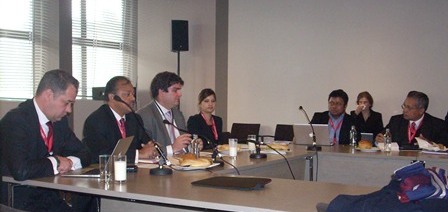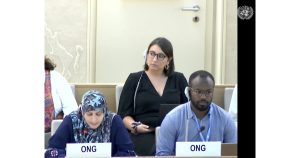On the occasion of the 11th session of the Assembly of States Parties (ASP) of the International Criminal Court (ICC) in The Hague, No Peace Without Justice convened a side event on “The Bangladesh International Crimes Tribunal”, on 21 November 2012 (from 13:00 to 15:00), at the World Forum (Oceania 2).
The Bangladesh International Crimes Tribunal (ICT) was established by the Government of Bangladesh to investigate and prosecute individuals accused of war crimes, crimes against humanity, genocide and crimes against peace committed during the Bangladesh Liberation War of 1971, from which Bangladesh emerged as an independent State. Its creation, on 25 March 2010, has the promise to bring an end to the culture of impunity that has existed for more than 40 years for the massive atrocities committed, loss of life and human suffering during the nine month conflict.
The purpose of the meeting was to discuss the current challenges faced by the ICT in fulfilling its mandate through an independent, fair and impartial judicial process. Speakers included Advasiful Islam, Prosecutor at the Bangladesh International Crimes Tribunal; Schona Jolly, Bar Human Rights Committee of England and Wales; Ahmed Ziauddin, Professor of International Criminal Law; Toby Cadman, Defence Counsel.
Background
The ICT was created through the International Crimes (Tribunals) Act 1973 of Bangladesh. The Act is a domestic law, passed by the Parliament of Bangladesh, and the justice process that it envisaged setting up is purely a domestic process. The Tribunalhas jurisdiction over crimes under international law that have been domesticated by the Act, which made them part of the subject matter jurisdiction of the Tribunal and of Bangladesh’s legal system.
Today’s Challenges
The crimes committed during the 1971 conflict still haunt Bangladesh and efforts to bring justice are essential for the country to moving forward without the heavy burden of impunity. All those who suffered during the conflict have a right to see justice through an independent and impartial judicial process.
The ICT has an historic mission to close this traumatic chapter and to give voice to the hundred of thousands of victims and survivors who deserve justice to be done and to be seen to be done. It can fulfil this mandate by bringing to justice those who ordered and committed wide-scale atrocities; providing acknowledgement and redress to countless victims; and creating an undeniable factual record of the events that reflects the real experiences of all affected communities. The ICT’s obligation and responsibility is, therefore, not just to punish perpetrators who are proved guilty beyond a reasonable doubt, but to provide a fair process that is explained to victims and to the people of Bangladesh, so that they can understand and follow the proceedings and feel that justice is being done.
The ICT should demonstrate its ability and willingness to conduct proceedings with fairness, impartiality and strict adherence to due process and to apply the highest international standards in the enforcement of crimes under international law. Unless the defence is able to bring witnesses and challenge the prosecution case free from harassment and intimidation, the ICT will have failed the victims and the promise of justice. Such a failure would make it inevitable for a future government to negate the tribunal’s achievements and to promote revisionist policies that will glorify perpetrators and vilify the victims. In particular, any application of the death penalty for individuals being tried by ICT will virtually guarantee that the process will be viewed by opponents and potential supporters alike as a clumsy attempt to exact political revenge on opposition leadership under the guise of fighting impunity.
To keep the promise of justice for victims that the ICT’s establishment represented, Bangladesh needs immediately and categorically to exclude the death penalty for individuals accused by the ICT and apply in full all due process guarantees, including protection of defence witnesses, potential witnesses and counsel from harassment and intimidation; full application of the presumption of innocence; and all other due process rights, to the highest international standards. As trials are ongoing, the ICT can still ensure that these standards are applied and that they are seen to be applied. It is essential that the legislative framework and procedures adopted by the Bangladeshi Government comply with its international human rights and other treaty obligations and ensure that the trial process is conducted in a fair and transparent manner, in order to prevent the ICT’s proceedings from being easily dismissed by a future government as unjust, widely condemned politically motivated judicial vengeance.
- Flyer of the event
- Audio of the discussion
- Transcript of the discussion
- “Bangladesh International Crimes Tribunal: Make Justice Count Through Fair Trials“, Op-ed by Niccolo’ Figa’-Talamanca and Nicola Giovannini*, Eurasia Review, 9 November 2012
- Special section dedicated to the 11th ASP to the ICC
NPWJ and the ICC
No Peace Without Justice, which is a founding member of the NGO Coalition for the International Criminal Court (CICC) and which has been one of the organisations at the forefront of promoting the establishment and entry into force of the permanent International Criminal Court (ICC) and continues to work for its universal ratification, has participated in every session of the ASP since its first session in 2002, the year the ICC was established.
For further information, contact Alison Smith on asmith@npwj.org or +32-2-548-3912 or Nicola Giovannini on ngiovannini@npwj.org or +32-2-548-3915.




